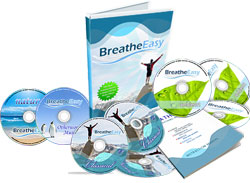A method of controlled breathing developed to lower high blood pressure may also hold the key to controlling anxiety and panic attacks…

"Slow breathing" offers hope as an alternative to dangerous drugs for those suffering from anxiety and panic disorder
Various breathing techniques have long been used for meditation and to relieve stress. And in the last decade medical researchers have developed a method called slow breathing that has been shown to reduce high blood pressure.
Meanwhile, the same method has been adapted for an extensive range of health purposes. We now know that the link between our breathing and other systems of the body, such as the circulatory system, is a powerful one.
The way it works is simple; because they are linked, slowing down and controlling your breathing “forces” your heart to also slow down. This allows major blood vessels around the heart to relax and thus lower your blood pressure. The connection goes further too; our breathing also influences the nervous system and even our brain waves.
Now a ”new” breathing therapy called Capnometry-Assisted Respiratory Training (CART) is being hailed as a promising new approach to controlling anxiety and panic attacks. In fact, medical experts at the University of California, Davis, believe it may be more effective than traditional cognitive therapy approaches (essentially, talking about the problem and trying to resolve it through rational thinking).
Breathing also has the potential to be more effective than drug therapy. Over the last couple of decades expensive and time-consuming talking therapies have been relegated to the sidelines as pharmaceutical treatment has become doctors’ preferred option. Anxiety and panic disorders have become a major growth area for the drugs industry.
Sadly, these medications have nasty side effects which often result in a lower quality of life for anxiety sufferers. So the news that breathing therapy may control anxiety more effectively than medications is surely a blessing.
Specifically, CART relieves anxiety and panic attacks by reversing hyperventilation, one of the most frequent and frightening sympoms of these conditions. Hyperventilation often becomes a self-perpeuating syndrome. The more the sufferer tries to stop it the worse it gets, generating greater panic and increasingly desperate attempts to control it… it’s a viscious circle.
Anxiety is a natural response we all experience but medical researchers have discovered that abnormal levels of anxiety actually have some organic origins. In other words: it’s not “all in the mind”. People with anxiety disorders show an abnormal response to certain stimuli. Tension alters their breathing, which changes blood chemistry through the buildup of carbon dioxide. This is the mechanism that triggers hyperventilation.
Slow, controlled breathing, on the other hand, stabilizes blood chemistry by balancing oxygen and carbon dioxide levels. Contary to popular belief, it’s not deep breathing that is beneficial. Deep breathing actually increases hypertventilation and thus the sensation of anxiety. The correct way to breathe to counter anxiety is slowly and shallowly.
Despite the new name – CART – therr is nothing new about this method of breathing. It’s been used for decades by asthma sufferers in a form called Buteyko Breathing. And, as pointed out at the start, slow breathing has also become a recognized way to lower blood pressure.



 A unique method of blood pressure control: The BreatheEasy Sytem
A unique method of blood pressure control: The BreatheEasy Sytem